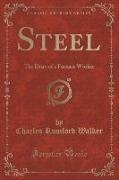Read more
Excerpt from Steel: The Diary of a Furnace Worker
In the summer of 1919, a few weeks before the Great Steel Strike, I bought some second-hand clothes and went to work on an open-hearth furnace near Pittsburgh to learn the steel business. I was a graduate of Yale, and a few weeks before had resigned a commission as first-lieutenant in the regular army. Clean-up man in the pit was my first job, which I held until I passed to third-helper on the open-hearth. Later I worked in the cast-house, became a member of the stove-gang, and at length achieved the semi-skilled job of hot-blast man on the blast-furnace. I acquired the current Anglo-Hunky language and knew speedily the grind and the camaraderie of American steel-making. In these chapters I have put down what I saw, felt, and thought as a steel-worker in 1919.
Steel is perhaps the basic industry of America. In a sense it is the industry that props our complex industrial civilization, since it supplies the steel frame, the steel rail, the steel tool without which locomotives and skyscrapers would be impossible. And in America it contains the largest known combination of management and capital, the United States Steel Corporation. Some appreciation of these things I had when I went to work in the steel business.
About the Publisher
Forgotten Books publishes hundreds of thousands of rare and classic books. Find more at www.forgottenbooks.com
This book is a reproduction of an important historical work. Forgotten Books uses state-of-the-art technology to digitally reconstruct the work, preserving the original format whilst repairing imperfections present in the aged copy. In rare cases, an imperfection in the original, such as a blemish or missing page, may be replicated in our edition. We do, however, repair the vast majority of imperfections successfully; any imperfections that remain are intentionally left to preserve the state of such historical works.

